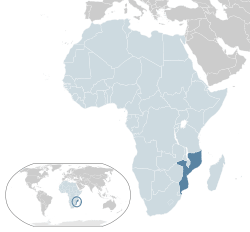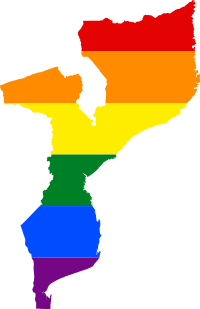LGBT rights in Mozambique
| LGBT rights in Mozambique | |
|---|---|
 | |
| Same-sex sexual intercourse legal status | Legal |
| Military service | No[1] |
| Discrimination protections | Sexual orientation protected (employment only) |
| Family rights | |
| Recognition of relationships | No |
| Adoption | No |
Lesbian, gay, bisexual and transgender (LGBT) people in Mozambique face legal challenges not faced by non-LGBT people. Same-sex sexual activity became legal in Mozambique under the new Criminal Code that took effect in June 2015.[2] Discrimination based on sexual orientation in employment has been illegal since 2007.
Mozambique, along with other former Portuguese colonies, is one of the most LGBT-friendly African nations. Polls have found moderate levels of support for LGBT rights and same-sex marriage. Nevertheless, same-sex couples are unable to marry or adopt, and LGBT people still face discrimination and prejudice.[3]
Legality of same-sex sexual activity
Until the enactment of the new Criminal Code, the legal status of same-sex sexual activity was ambiguous in Mozambique. In March 2011, the Minister of Justice declared during the UN Human Rights Council's Universal Periodic Review that homosexuality is not an offence in Mozambique.[4][5] However, the Criminal Code did contain an offence of "practices against nature".[6] According to the ILGA, this clause could have potentially been interpreted as including male and female same-sex sexual activity, even though it was unknown to what extent the law was enforced. Indeed, reports stated that the incidence of the statute being enforced against LGBT individuals had been slim to none.[7][8]
In December 2014, President Armando Guebuza signed the new Criminal Code, which does not contain any provisions regarding same-sex sexual activity, into law.[9][10] It was published in the country's official journal on 31 December 2014 and took effect 180 days later (i.e. 30 June 2015).[2]
Recognition of same-sex relationships

Mozambique does not provide any form of recognition of same-sex relationships, though protests for same-sex marriage and common-law marriage have been ongoing since 2006.[11]
Discrimination protections
In line with most other former Portuguese African colonies, Mozambique is reported to be one of the most tolerant countries in Africa towards gays and lesbians.[12][13][14] While the Government has reported fairly little on LGBT rights, all of what has been said has been positive.[15] It is one of the only few countries in Africa to offer any form of discrimination protections for gay, lesbians and bisexuals, which have been in place since 2007.[7] Protests for such legislation had been kick started only a year before, signaling a reasonably swift response by the Government.[16]
Article 4 of the 23/2007 Labour Law provides for "non-discrimination on grounds of sexual orientation, race or HIV/AIDS status". Article 5 of the law grants employees a right to privacy, relating to "the private and personal lives of employees, such as their family lives, personal relationships, sex lives, state of health and their political and religious convictions." Article 108 of the law provides that "all employees, whether nationals or foreigners, without distinction based on sex, sexual orientation, [...] have the right to receive a wage and to enjoy equal benefits for equal work".[17][18]
Public opinion
A September 2013 survey of people in the cities of Maputo, Beira and Nampula found moderate levels of support for the legal recognition of same-sex couples and parenting rights:[19]
| Maputo | Beira | Nampula | |
|---|---|---|---|
| Same rights for same-sex and opposite-sex couples | 42.7% | 32.0% | 47.2% |
| Same-sex marriage | 37.0% | 17.9% | 28.2% |
| Same-sex adoption | 49.5% | 40.2% | 44.9% |
A 2016 Afrobarometer opinion poll found that 56% of Mozambicans would welcome or would not be bothered by having a homosexual neighbor. Mozambique was one of the only four countries polled with a majority in favor. (the others being Cape Verde (74%), South Africa (67%) and Namibia (55%))[20]
According to a 2017 poll carried out by ILGA, 61% of Mozambicans agreed that gay, lesbian and bisexual people should enjoy the same rights as straight people, while 23% disagreed. Additionally, 66% agreed that they should be protected from workplace discrimination. 32% of Mozambicans, however, said that people who are in same-sex relationships should be charged as criminals, while a plurality of 43% disagreed. As for transgender people, 66% agreed that they should have the same rights, 68% believed they should be protected from employment discrimination and 55% believed they should be allowed to change their legal gender.[21]
A 2017 survey of people in the cities of Maputo, Beira and Nampula again found moderate levels of support for LGBT rights. Support for same-sex marriage increased in all three cities to 47% in Maputo, 38% in Beira and 42% in Nampula. Support for same-sex adoption was 33% in Maputo, 43% in Beira and 42% in Nampula. In addition, the survey also found that 85% opposed violence against LGBT people and would come to help them if they were being physically assaulted. However, most respondents said they would not accept their child if he/she came out (with 28% of Beira respondents stating they would assault their child if he/she was gay). 37.5% would react negatively if a co-worker came out, while 37.9% would accept them and 20.6% would be indifferent. Furthermore, about one-third stated that they personally knew an openly LGBT person, and two-thirds said they would not want a gay president.[22][23]
Living conditions
Hate crimes and violence directed at the LGBT community are rare in Mozambique, unlike in other African countries. However, discrimination is not unheard of.[24]
A notable figure to have spoken out in support of LGBT rights in Mozambique and the rest of Africa is former President Joaquim Chissano who also spoke to other African leaders to stop laws that impede on LGBT rights in Africa.[25][26]
Lambda, a local LGBT group, has requested to register as a non-governmental organization since 2008.[27] A process which usually lasts six weeks. In 2010, after being ignored by the Ministry of Justice for two years, the group took their case to the United Nations, appealing to the High Commission for Human Rights to act on the violation of their right to association.[28] The UN Human Rights Council had been calling on Mozambique to register Lambda since 2011.[29] In October 2017, the Mozambique Constitutional Council unanimously declared the Government's refusal to register Lambda unlawful and unconstitutional.[30]
Summary table
| Same-sex sexual activity legal | |
| Equal age of consent | |
| Anti-discrimination laws in employment | |
| Anti-discrimination laws in the provision of goods and services | |
| Anti-discrimination laws in all other areas (incl. indirect discrimination, hate speech) | |
| Same-sex marriage | |
| Recognition of same-sex couples | |
| Stepchild adoption by same-sex couples | |
| Joint adoption by same-sex couples | |
| LGBT people allowed to serve openly in the military | |
| Right to change legal gender | |
| Access to IVF for lesbians | |
| Commercial surrogacy for gay male couples | |
| MSMs allowed to donate blood |
See also
References
- ↑ Mady Wechsler Segal (2003). Armed forces and international security: global trends and issues. Jean M. Callaghan, Franz Kernic (editors). Transaction. p. 218. ISBN 3-8258-7227-0.
- 1 2 "State-sponsored Homophobia: A world survey of laws prohibiting same sex activity between consenting adults" (PDF). International Lesbian and Gay Association (ILGA).
- ↑ After 10 Years of Legal Battles, Mozambique's Only LGBT Organization Takes a Step Closer to Legal Recognition
- ↑ Mozambique Gay Rights Group Wants Explicit Constitutional Protections
- ↑ Mozambique: Praise for Recognition That Gay Sex Not Illegal
- ↑ Gay Mozambique News & Reports
- 1 2 "State-sponsored Homophobia: A world survey of laws prohibiting same sex activity between consenting adults" (PDF). International Lesbian and Gay Association (ILGA). Archived from the original (PDF) on 19 July 2013.
- ↑ Mozambique by Mary Fitzpatrick (Lonely Planet) – pg 174
- ↑ Mozambique: Presidente promulga nuevo Código Penal que legaliza el aborto
- ↑ Moçambique reafirma que homossexualidade não constitui crime
- ↑ Gay Mozambique News & Reports
- ↑ Biggest Ever Studies on Attitudes to Religion and Morality in Africa Released
- ↑ BIGGEST EVER STUDIES ON ATTITUDES TO RELIGION AND MORALITY IN AFRICA RELEASED
- ↑ Mozambique discovers its gay minority
- ↑ Homosexuality now debated all over Africa
- ↑ Mozambique discovers its gay minority, Afrol news
- ↑ Labour Law, law nr. 23/2007 Archived 29 May 2015 at the Wayback Machine.
- ↑ (in Portuguese) Lei n.º 23/2007 (p. 20), Boletim Da República, 1 de Agosto de 2007 Archived 12 April 2015 at the Wayback Machine.
- ↑ Attitudes towards homosexuality 2013
- ↑ Africa’s most and least homophobic countries Erasing 76 Crimes
- ↑ ILGA-RIWI Global Attitudes Survey ILGA, October 2017
- ↑ ATTITUDES TOWARDS HOMOSEXUALITY IN MAPUTO, BEIRA AND NAMPULA - 2017
- ↑ Most Mozambicans against homosexual violence, study finds, Mambaonline, 4 June 2018
- ↑ Mozambique LGBT activists move on to next battle after anti-gay law scrapped The Guardian
- ↑ An Open Letter to Africa's Leaders - Joaquim Chissano, former President of Mozambique
- ↑ Mozambique’s former president calls for gay rights in Africa
- ↑ A Fight for Recognition: The LGBT Community’s Battle in Mozambique
- ↑ MOZAMBIQUE GAY RIGHTS GROUP FIGHTS TO BE REGISTERED Mambaonline
- ↑ Mozambique accused of “double speak” on LGBTI Rights Mambaonline
- ↑ Mozambique | Major constitutional victory for LGBTQ community Mambaonline, 9 November 2017